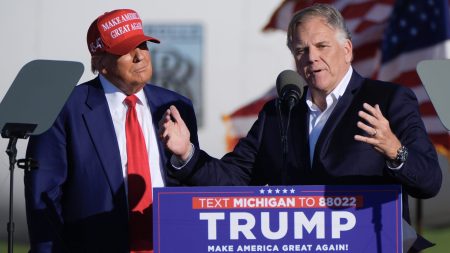A federal judge in Iowa has temporarily halted the state’s efforts to enforce its own immigration laws. The law in question would have allowed the state to file criminal charges against illegal immigrants with outstanding deportation orders or who had previously been denied entry to the U.S. U.S. District Court Judge Stephen Locher issued the block on enforcement, citing that the federal immigration law supersedes that of individual states. The judge’s ruling stated that the Iowa legislation is preempted by federal law and is therefore invalid under the Supremacy Clause.
Republican Iowa Gov. Kim Reynolds signed the “illegal re-entry” bill into law earlier in the year, following similar legislation in Texas. Both states have heavily criticized President Biden’s handling of border policies. Reynolds and Iowa Attorney General Brenna Bird have expressed plans to appeal the ruling, with Bird stating that Iowa would not have needed to pass such a law if it weren’t for what she described as Biden’s open border policies. Reynolds argued that the Biden administration has left states “defenseless” against the crisis at the southern border, accusing the administration of failing to enforce federal immigration laws.
The Iowa law, scheduled to take effect on July 1, is the subject of ongoing litigation and potential appeals. The Justice Department has also announced plans to challenge similar legislation in Oklahoma in the near future. The officials in Iowa have criticized the Biden administration for allowing millions to enter or re-enter the country without facing any consequences or delays. They argue that the administration’s lax enforcement of immigration laws has posed a significant security threat and left states vulnerable to the challenges at the border. The legal battle around state immigration laws continues to unfold amid a broader national debate on immigration policy and enforcement.
The federal judge’s ruling in Iowa serves as a temporary setback for the state’s efforts to enforce stricter immigration laws. The debate over state versus federal authority in immigration enforcement is a complex legal issue, with the judge citing Supreme Court precedent in determining that the Iowa legislation is preempted by federal law. The ongoing legal battles surrounding immigration laws in states like Iowa and Texas underscore the broader political tensions around immigration policy in the United States. Critics of the Biden administration argue that its approach to border security has empowered states to take matters into their own hands, leading to a patchwork of state laws and potential conflicts with federal immigration policy.
The Iowa case highlights the challenges and complexities of immigration enforcement in a politically charged environment. The tensions between state and federal authorities in determining immigration policy and enforcement strategies continue to play out in the courts and in the political arena. The legal battle around Iowa’s immigration law reflects broader debates about national security, border control, and the rights of undocumented immigrants. As the legal battle unfolds, it is likely to have implications for similar legislation in other states and for the broader national conversation on immigration policy. The outcome of these legal challenges will have far-reaching implications for the enforcement of immigration laws and the rights of immigrants in the United States.















